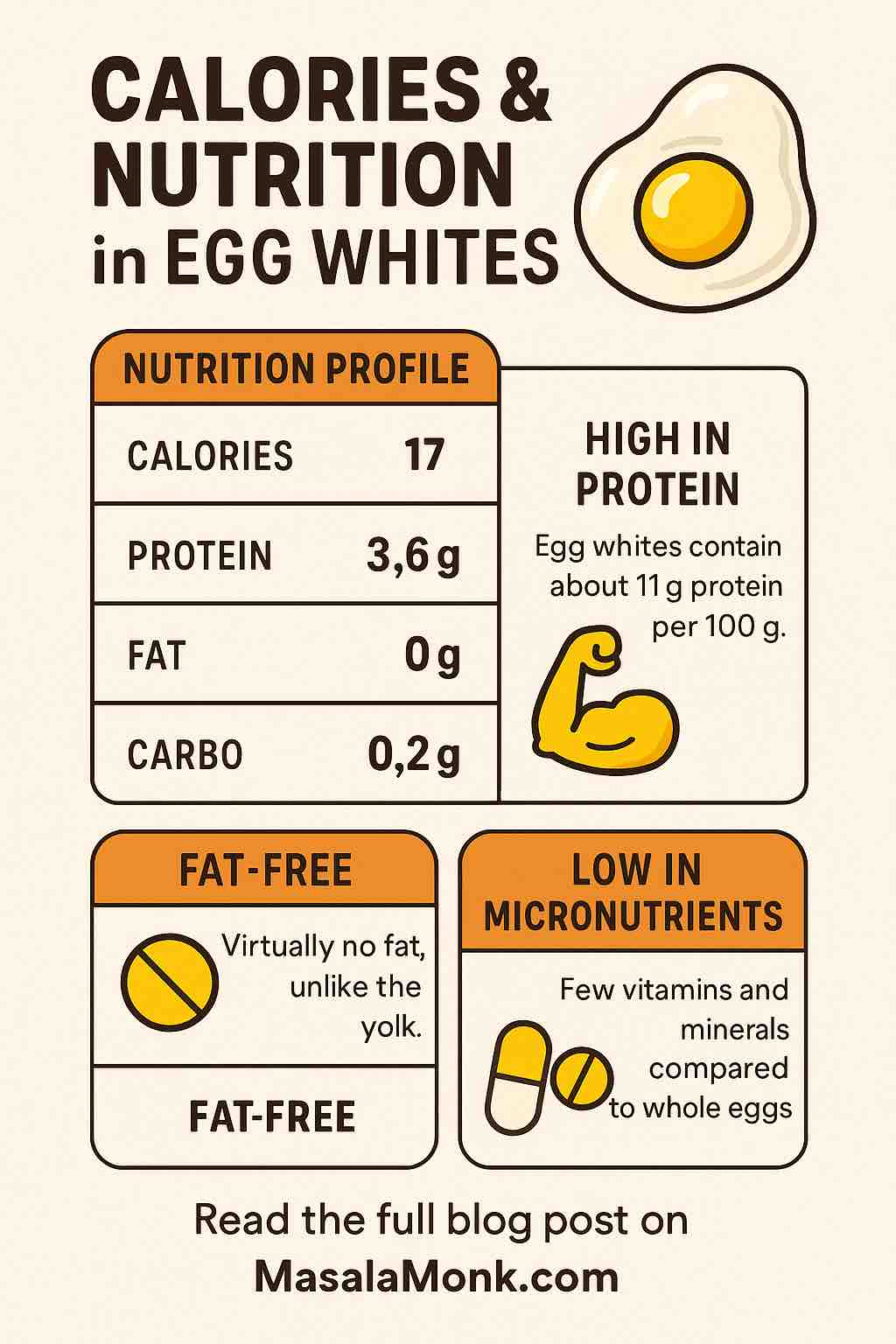
When it comes to healthy eating, few ingredients are as universally recommended as the humble egg white. Stripped of its golden yolk, the egg white is often hailed as a low-calorie, high-protein powerhouse. But what exactly makes it so special? And is it truly the best part of the egg when it comes to nutrition? Let’s peel back the shell and explore the facts.
The Basics: What Is an Egg White?
Egg whites, also known as albumen, are the clear, viscous substance surrounding the yolk. Comprising approximately two-thirds of an egg’s total weight, egg whites consist of about 90% water and 10% protein. They are naturally fat-free and contain minimal carbohydrates, making them a staple in many diet-conscious meal plans.
Nutritional Breakdown: Per Large Egg White (33g)
- Calories: 17 kcal
- Protein: 3.6 grams
- Fat: 0 grams
- Carbohydrates: 0.2 grams
- Cholesterol: 0 mg
- Sodium: 55 mg
- Potassium: 54 mg
When scaled to 100 grams (approximately 3 egg whites), the profile expands to:
- Calories: 52 kcal
- Protein: 10.9 grams
- Fat: 0.17 grams
- Carbohydrates: 0.73 grams
- Sodium: 166 mg
- Potassium: 163 mg
- Water Content: ~87.6 grams
This makes egg whites an excellent source of lean protein, with an impressive amino acid profile that includes all nine essential amino acids.
Protein Powerhouse: Quality and Bioavailability
Egg white protein is often used as a benchmark in biological value (BV) and protein digestibility studies. Its primary protein, ovalbumin, is accompanied by others like ovotransferrin, ovomucoid, and lysozyme. Together, these proteins offer high digestibility and muscle-repairing capabilities, making egg whites particularly valuable to athletes, bodybuilders, and those recovering from injury.
Low in Calories, Rich in Purpose
What makes egg whites especially attractive in nutritional planning is their low-calorie density. At just 17 calories per egg white, you can consume multiple servings without significantly impacting your calorie intake. This is especially useful in:
- Weight loss programs: Fewer calories, more satiety.
- Bodybuilding diets: High protein intake with minimal fat.
- Cholesterol-sensitive diets: No cholesterol, unlike yolks which carry about 186 mg per egg.
Micronutrients: A Sparse But Notable Profile
While egg whites are not micronutrient powerhouses like yolks, they do contain some vital elements:
- Riboflavin (B2): Essential for energy production.
- Selenium: An antioxidant mineral supporting immune function.
- Magnesium and Potassium: Involved in muscle function and hydration.
However, they lack fat-soluble vitamins (A, D, E, and K), iron, zinc, and vitamin B12—most of which are concentrated in the yolk.
Raw vs. Cooked: The Avidin Factor
Consuming raw egg whites is sometimes practiced in fitness circles, but it comes with a caveat. Raw whites contain avidin, a protein that binds biotin (vitamin B7), potentially leading to deficiency over time. Cooking deactivates avidin, making cooked egg whites the safer and more nutritious choice.
Egg Whites vs. Whole Eggs: Should You Skip the Yolk?

While egg whites have their benefits, removing the yolk means missing out on:
- Healthy fats (including omega-3s)
- Choline (vital for brain function)
- Fat-soluble vitamins
- Complete nutrient synergy
Whole eggs offer a more complete nutrient package and are not inherently unhealthy when consumed in moderation.
| Nutrient | Whole Egg (50g) | Egg White (33g) |
|---|---|---|
| Calories | ~70 kcal | ~17 kcal |
| Protein | ~6.3 g | ~3.6 g |
| Fat | ~5 g | 0 g |
| Cholesterol | ~186 mg | 0 mg |
| Vitamin A, D, E, K | Present | Absent |
Who Should Use Egg Whites?
- Athletes & Bodybuilders: For lean muscle gain without extra fat.
- People with Heart Conditions: Low cholesterol option.
- Weight Watchers: Low-calorie protein source.
- Veggie-Based Eaters (Non-Vegan): Adds protein without meat.
Cooking with Egg Whites
Egg whites are incredibly versatile. You can scramble, poach, bake, or whip them into airy textures for recipes like:
- Protein pancakes
- Meringues
- Egg white muffins
- Low-fat omelets
- Shakes and smoothies (pasteurized)
They also function as binding agents in baking and thickening agents in sauces.
Final Thoughts: Are Egg Whites Worth the Hype?
Egg whites are a nutritional treasure for anyone seeking a low-calorie, high-protein food. However, context matters. While egg whites are excellent for focused goals like fat loss and muscle maintenance, they shouldn’t always replace whole eggs, which offer a broader nutrient spectrum.
In the end, the best choice depends on your dietary needs, health goals, and overall nutritional strategy. Whether you crack the whole egg or just the white, you’re still getting one of nature’s most efficient sources of nourishment.
🔍 Frequently Asked Questions (FAQs)
- Are egg whites healthier than whole eggs?
Egg whites are lower in calories, fat, and cholesterol compared to whole eggs, making them ideal for specific dietary goals like weight loss or low-cholesterol diets. However, whole eggs contain more vitamins, healthy fats, and nutrients like choline and vitamin D. - How many calories are in one egg white?
A large egg white (about 33 grams) contains approximately 17 calories. - Is it safe to eat raw egg whites?
Raw egg whites may pose a risk of salmonella and can inhibit biotin absorption due to avidin. It’s best to consume them cooked or use pasteurized egg whites if eating raw. - Do egg whites contain cholesterol?
No, egg whites contain zero cholesterol. All the cholesterol in an egg is found in the yolk. - Can egg whites help with weight loss?
Yes. Egg whites are low in calories and high in protein, which can help you feel full and preserve muscle mass during calorie restriction. - Are egg whites good for building muscle?
Absolutely. They provide high-quality, complete protein, essential for muscle repair and growth, especially beneficial post-workout. - What nutrients are missing in egg whites?
Egg whites lack fat-soluble vitamins (A, D, E, K), choline, iron, and B12—all of which are found in the yolk. - How many egg whites can I eat per day?
There’s no strict limit, but moderation is key. 3–6 egg whites per day are commonly consumed by those on high-protein or fitness-oriented diets. - Can I replace whole eggs with egg whites in recipes?
Yes, especially in omelets, baking, and shakes. Use 2 egg whites for every 1 whole egg as a general substitution rule. - Are egg whites suitable for people with high blood pressure?
Yes. They are low in sodium (especially if unsalted during cooking), fat-free, and protein-rich, which supports heart health.










[…] 4. Cooked vs. Raw: Find Your ToleranceMany with egg intolerance handle fully cooked or baked eggs far better than soft-boiled, poached, or raw forms. Cooking breaks down many problematic proteins. If you find you tolerate one and not the other, work with your nutritionist to personalize your approach. For more on the nutrition of different egg preparations, see Calories & Nutrition in Egg Whites. […]